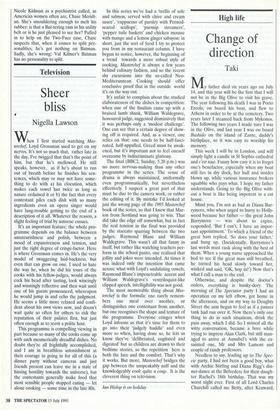Television
Sheer bliss
Nigella Lawson
When I first started watching Mas- terchef, Loyd Grossman used to get on my nerves. It's not so much that, rather late in the day, I've twigged that that's the point of him, but that he's mellowed. He still speaks, however, as if he's about to run out of breath before he finishes his sen- tences, which may or may not have some- thing to do with a) his elocution, which makes each vowel last twice as long as nature ordained it or b) the fact that every contestant piles each dish with so many ingredients even an opera singer would have lung-trouble getting to the end of a description of it all. Whatever the reason, a slight feeling of trial by autocue ensues.
It's an important feature: the whole pro- gramme depends on the balance between amateurishness and polish, between a mood of expansiveness and tension, and just the right degree of cringe-factor. Here is where Grossman comes in. He's the very model of swaggering laid-bacluiess, but even that can grow on one. I used to hate the way he, when he did his tours of the cooks with his fellow-judges, would always cock his head after tasting, look wincingly and winningly reflective and then wait until one of his guests pronounced, whereupon he would jump in and echo the judgment. He seems a little more relaxed and confi- dent about his own views now, and doesn't wait quite so often for others to risk the reputation of their palates first, but just often enough as to seem a polite host.
This programme is compelling viewing in part because so many of the cooks come up with such mesmerically dreadful dishes. No doubt they're all frightfully accomplished, and I am in breathless astonishment at their courage in going in for all of this (a dinner party without cameras and just friends present can leave me in a state of hissing hostility towards the universe), but the contestants generally make food that most sensible people stopped eating — let alone cooking — some time in the late 80s. In this series we've had a 'trellis of sole and salmon, served with chive and cream sauce', 'cappucino of parsley with Pernod- seared scallops', 'parsnip streamers', 'pepper tuile baskets' and chicken mousse with mango and a lemon ginger sabayon: in short, just the sort of food I try to protect you from in my restaurant column. I have begun to notice, however, the beginning of a trend towards a more robust style of cooking. Masterchef is always a few years behind culinary fashion, and so the recent shy excursions into the so-called Neo- Mediterannean Cooking should offer conclusive proof that in the outside world it's on the way out.
It's unfair to complain about the studied elaborateness of the dishes in competition: when one of the finalists came up with a braised lamb shank, William Waldegrave, honoured judge, suggested dismissively that it was perhaps only a 'modest challenge'. One can see that a certain degree of show- ing off is required. And, as a viewer, one relies on that: one needs to be half-fasci- nated, half-appalled. Greed must be awak- ened, but it's important not to feel oneself overcome by indiscriminate gluttony.
The final (BBC2, Sunday, 5.20 p.m.) was no more nervous-making than any other programme in the series. The sense of drama is always maintained, uniformally even programmatically, but nevertheless effectively. I suspect a great part of that must be due to the camera work, or rather the editing of it. By mistake I'd looked at just the wrong page of the 1995 Masterchef book of the series, so that I knew that Mar- ion from Scotland was going to win. That did take the edge off somewhat, but in fact the real tension in the final was provided by the staccato sparring between the two judges, Raymond Blanc and William Waldegrave. This wasn't all that funny in itself, but rather like watching teachers per- form in the school panto, one realised that jollity and jokes were intended. At times it was indeed only the intention that came across: what with Loyd's undulating vowels, Raymond Blanc's impenetrable accent and William Waldegrave's ventriloquist-like clipped speech, intelligibility was not good.
The most memorable thing about Mas- terchef is the formula: one rarely remem- bers one meal over another, or distinguishes one contestant from another, but one recognises the shape and texture of the programme. Everyone cringes when Loyd informs us that it's time for them to go into their `judgely huddle' and even more so when, having done so, he lets us know they've 'deliberated, cogitated and digested' but as children are drawn to their bedtime stories, so the repetition here is both the lure and the comfort. That's why it works. But more, Masterchef bridges the gap between the unspeakably naff and the knowledgeably cool: quite a coup. It is the cleverest thing on television.
Ian Hislop is on holiday


















































 Previous page
Previous page